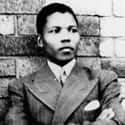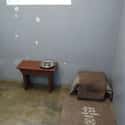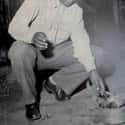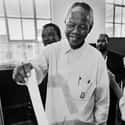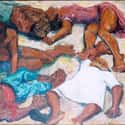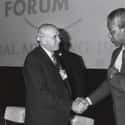-
(#1) He Created South Africa's First Black Law Firm
Nelson Mandela was born Rolihlahla Mandela on July 18, 1918 in a rural area of the Transkei region of South Africa. His name was anglicized to "Nelson" when he became the first member of his family to attend school. At age 9, Mandela's father died, and Nelson was adopted by an influential tribal chieftain. Eventually, however, Mandela's activist bent would make it impossible for him to continue his education in Johannesburg; a family dispute over an arranged marriage and a threatened expulsion over student politics prompted him to flee. However, he managed to complete his education and ultimately enrolled in law school. He eventually founded the first black-partnered law firm in South Africa with another student acquaintance, Oliver Tambo. Mandela and Tambo represented black litigants and defendants who normally would not have been able to afford legal counsel.
-
(#9) He Was Imprisoned For Life And Still Refused To Negotiate
Nelson Mandela's trial drew protest from around the world over his anticipated death penalty. However - possibly because of this international pressure on the South African government - even though all but one of the defendants were convicted, none, including Mandela, were condemned to death. Instead the 10 convicted men were sentenced to life imprisonment. One white defendant served his sentence in Pretoria, and the rest were sent to the notorious Robben Island facility, a segregated prison for black inmates only. Conditions there were incredibly harsh and included forced labor in a quarry. Upon arrival, Mandela and the other prisoners were greeted with white warders shouting "This is the island! Here you will die!"
Over time, the South African government offered Nelson Mandela conditional opportunities for release. He repeatedly refused these opportunities to negotiate, however, even after decades of imprisonment.
-
(#2) He Did More In His Twenties Than Most People Do In Their Lifetimes
From a young age, Nelson Mandela was involved in the political struggle against the racially based South African system of apartheid. He joined the African National Congress in 1942 and immediately set out to turn this organization into a meaningful activist entity by starting the ANC Youth League, a mass movement that incorporated voiceless members of South African black society into the conversation regarding equal rights. This organization aggressively used tactics such as strikes, boycotts, and civil disobedience to effectively oppose the South African government.
-
(#12) He Was The First President Elected By Universal Suffrage
In their apartheid-ending negotiations, Mandela and de Klerk agreed that free elections would be a part of the fundamental changes to South African society. As a result, in April of 1994, Nelson Mandela was elected President of the country's first multi-racial government, running unopposed. The ANC won 62% of the vote along with the majority of the seats in the National Assembly. Mandela attempted immediate measures to improve the standard of living for black South Africans and continued to support a policy of national reconciliation and patriotism. He helped finalize the process for the adoption of a democratic constitution. Towards the end of his first term, Mandela began the gradual transferral of his political power to other members of the ANC.
-
(#5) He Said F*ck It To Nonviolence
In the '50s, Mandela and the ANC began to be split into factions, one of which was called the Pan Africanist Congress (PAC). The PAC began an organized campaign designed to protest against the "Pass" system, which was, essentially, an internal passport that black South Africans along with other minority groups were forced to carry within certain segregated territories of South Africa. If their pass was not stamped appropriately, individuals could be detained and arrested. This formal arrangement to impose segregation by geographic access was a major flash point during the apartheid conflict. The head of the PAC announced a nationwide protest against the "Pass," to be held on March 21, 1960. In the town of Sharpville, a crowd of approximately 5,000 protesters surrounded a police station in preparation to turn themselves in and swamp the legal system. Eventually, though, the protest prompted law enforcement to fire sub-machine guns into the crowd, killing at least 69 people and wounding many more.
This action was not only formally condemned by the UN, but it also galvanized the apartheid protest movement in South Africa, including Nelson Mandela. In the aftermath of the massacre, Mandela concluded that non-violence in the face of state violence was ineffectual. So, following the incident, Mandela burnt his passbook before members of the world press.
-
(#10) He Served His Sentence In The Most Dangerous Prison In South Africa
Nelson Mandela spent 18 of his 27 total years of imprisonment at the notorious Robben Island. The South African government eventually transferred him to another facility, hoping that if he was isolated away from his former ANC brethren, he might be more willing to cooperating with the regime. Mandela, however, remained intractable, and as the system of apartheid became untenable as a result of international sanctions, the South African president, FW De Klerk, made the decision to not only release Mandela but to also legalize the ANC and various other political entities opposed to apartheid. This did not mean the end of political and social oppression in South Africa. De Klerk and Mandela would later begin the negotiations that would fundamentally change South African politics and society.
New Random Displays Display All By Ranking
About This Tool
On February 11, 1990, Nelson Mandela was released from prison after 27 years of arrest and soon continued to serve as President of South Africa. Even after his death, his great spirit and deeds inspired countless people to advocate for peace and social justice. Mandela was an active anti-apartheidist, after entering politics, he successfully organized and led the "Contempt of Unjust Acts Movement" and won the respect of all blacks.
Mandela received praise from all over the world, including winning the 1993 Nobel Peace Prize in recognition of his contributions to South Africa and world peace. The random tool introduced 15 fascinating facts about the difficult but inspiring life of Nelson Mandela.
Our data comes from Ranker, If you want to participate in the ranking of items displayed on this page, please click here.











